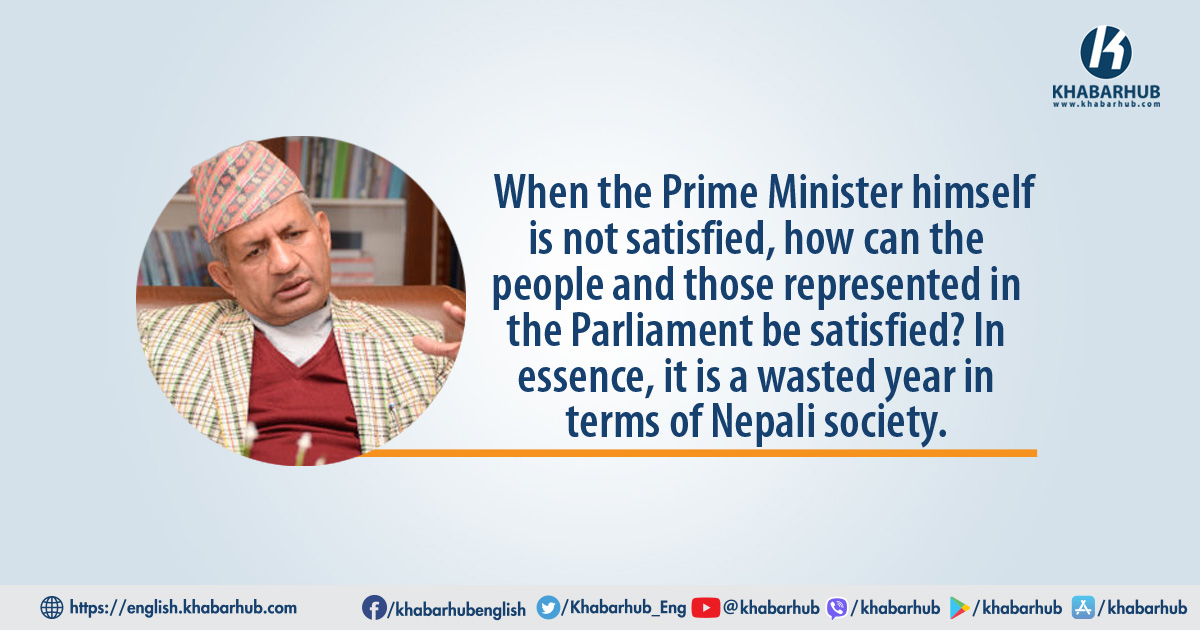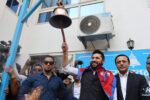KATHMANDU: CPN-UML Deputy General Secretary Pradeep Gyawali expressed strong views on the current political landscape, placing the blame squarely on Prime Minister Pushpa Kamal Dahal for the ongoing challenges.
Gyawali emphasized that the root of the problem lies with the prime minister’s approach and performance, not with the ministers or the secretariat.
Here is an excerpt from the conversation with Gyawali, shedding light on the government’s one-year tenure:
What is the assessment of the main opposition party CPN-UML when the Prachanda-led government, to which you also gave a vote of confidence, is spending one year?
This government stood on the foundation of a kind of political opportunism, moral ejaculation, and deviation.
Yesterday they fought the election on the basis of a coalition, and when the coalition refused to give a prime minister, he extended his hand to us, and we made him the prime minister with good intentions. He immediately changed the equation.
In politics, there is a sense of advancing ethics and a clear political direction. It cannot be assessed in any data.
However, whether politics is successful or not is based on its moral ground. In that sense, the way the Prime Minister of this government manipulated the equations for his absolute power interests, this government is very weak. There is no other solution except political opportunism and collusion.
Looking at the presentation of one year, the expressions expressed by the Prime Minister himself are enough.
He himself is not satisfied with this government. Sometimes they say that I go to the streets for protest, sometimes they say that I will change the ministers and work efficiently.
When the Prime Minister himself is not satisfied, how can the people and those represented in the Parliament be satisfied? In essence, it is a wasted year in terms of Nepali society.
Let’s delve into the recent statements you made about the Prime Minister. You mentioned doubts regarding the claim that the Prime Minister is ready to work. Do you believe he faced resistance from the secretariat or bureaucracy?
Indeed, there has been a recurring narrative since the Panchayat period, where some attribute a leader’s challenges to the people around them.
It’s a familiar argument – the leader is willing, but those surrounding him hinder progress.
While I acknowledge concerns about the competence of the bureaucracy in our country, it’s crucial to recognize that bureaucracy has become process-oriented rather than result-oriented, leading to distortions and stains of corruption in politics.
So, are you saying the bureaucracy’s lack of support is not a valid reason for the Prime Minister’s difficulties?
Exactly. In Nepal’s bureaucracy, there is no lack of authority to the extent that decisions made by the Prime Minister and Ministers cannot find support.
The challenge lies in how the political leadership operates within this framework, how it instills confidence, and navigates the bureaucracy.
Take the Lalita Niwas case, for instance. The morale of the bureaucracy is declining, and it’s evident when staff members claim that their actions were carried out under the Prime Minister’s instructions during meetings at the official residence.
The former Prime Minister, who was actively involved, evaded consequences, while lower-ranking officials faced arrests.
You’re highlighting a disconnect between political leadership and the consequences faced by lower-level employees. How does this impact the morale and decision-making within the bureaucracy?
The employees’ morale diminishes when they become scapegoats for decisions made by political leaders or bosses.
To boost morale, the government should assure employees that their good intentions and diligent work will be protected.
If there’s fear of reprisal, it impedes effective decision-making and overall government functionality.
Blaming ministers or the secretariat doesn’t address the core issue.
It’s essential to foster an environment where the bureaucracy collaborates seamlessly with political leadership for the betterment of the nation.
You’ve been vocal about the challenges within the government, particularly focusing on the Prime Minister’s role. Can you elaborate on what, in your opinion, is the root cause of these issues?
Certainly, the core issue lies in the Prime Minister himself—his approach and performance. Managing ministers is his responsibility, and how he handles it reflects on the overall governance.
His focus on holding power for one year as an achievement raises concerns about the priorities and outcomes of his leadership.
Looking back at the government’s one-year tenure, do you see any notable accomplishments or positive actions?
Frankly, I haven’t witnessed anything significant worth remembering. The government’s promise of good governance has become more of a source of frustration for the Prime Minister’s opposition.
Take the Jalhari of Pashupatinath temple, the Bhutanese refugee issue, and the gold scandal—whenever the investigation approached individuals close to him, there seemed to be interference or protection.
In the Lalita Niwas case, he termed it organized crime, but when his coalition partners were implicated, he punished a lower-level employee while letting the main decision-maker go free.
The handling of the Sunkanda scandal raised questions about fairness, with leaders accused but not properly scrutinized.
You’ve mentioned issues related to good governance and scandals. How has this impacted the rule of law and citizens’ experiences during this period?
The rule of law has faced challenges, particularly in the realm of law and human rights.
For instance, under the previous Prime Minister, there was an attempt to monitor social media and information technology, but it couldn’t materialize into law. Today, however, various social networks have not only been controlled but outright prohibited based on government directives.
Democratic space is gradually shrinking, and this decision-making seems arbitrary, not rooted in any legal framework.
For instance, designating prohibited areas in Kathmandu without clear legal basis and restricting democratic activities raises concerns about the Prime Minister’s rule becoming increasingly authoritative.
In summary, you believe that the democratic space is narrowing, and decisions are being made at the discretion of the government rather than being grounded in established laws. Would you say this is indicative of the Prime Minister’s governing style?
Absolutely, the example of controlling social networks and restricting democratic activities without a legal basis is emblematic of a governing style that appears to be more focused on consolidation of power than on upholding democratic principles.
There are talks about your upcoming mission to dismantle the current alliance and forge a new one to address the country’s challenges. Could you shed light on this?
Certainly, our foremost concern is the critical state of the country, particularly the escalating economic crisis.
The government has resorted to internal loans to meet salary obligations since July of this financial year, signaling a dire financial situation where revenue falls short of covering basic expenses.
Despair is pervasive in society, and the troubling trend of youth exodus is a cause for serious concern.
Businessmen are disillusioned, and there are indications of ministers contributing to the disruption of social harmony.
Our primary focus is on addressing Nepal’s worsening economic, social, and political situation; power equations are not our primary concern at the moment.
You’ve mentioned the current alliance and the challenges facing the nation. Can you elaborate on the strategy to navigate these issues?
Our approach is grounded in addressing the pressing issues at hand. While we are not prioritizing changes in power dynamics, we observe a growing crisis within the current alliance.
Nepali Congress leaders are expressing the need to question the Prime Minister, signaling a potential shift in their stance.
How they choose to move forward is their decision, but there appears to be a rising sense of distrust within their ranks regarding the government.
We are engaging in discussions with various parties to explore ways to move the country forward amidst these challenges.
Our focus is on understanding their agendas, exploring potential solutions, and discussing viable options.
Changing the government is not an end in itself; it must be driven by a concrete agreement that addresses the nation’s problems comprehensively.
So, if there is a concrete agreement to address the country’s challenges, you would consider a change in the government?
Absolutely, our commitment is to the well-being of the country, and if there is a clear and concrete agreement that provides solutions to the economic, social, and political issues we currently face, we are open to considering changes in government.
The priority is finding effective solutions that benefit the nation as a whole.









Comment